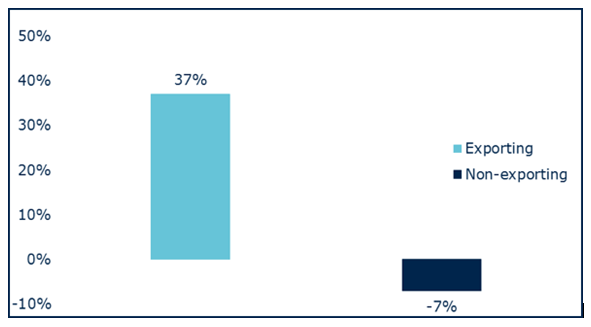Is Exporting the Key to Increased Revenues?
In today’s uncertain environment, senior managers are increasingly challenged to find new ways of growing revenues. One time-tested method is entering new markets. While expansion can involve challenges, the rewards can be truly remarkable.
Real opportunities for growth
North American companies that don’t export could be overlooking a tremendous opportunity. After all, more than 70% of the world’s purchasing power is outside the U.S. and Canada.1
What’s more, the United States International Trade Administration recently found that more than 70% of U.S. small and mid-sized enterprises that export enjoyed a 37% increase in sales between 2005 and 2009. During this same period, American SMEs that didn’t export saw a 7% decline in sales.2
The proof is in the pudding. North American SMEs can enjoy significant revenue boosts when they export their products or services. The key is to discover what offerings work best in which markets.
Sales growth for American SMEs, 2005–2009 2
Improved labor productivity
In its 2010 study of SME exporting, the U.S. International Trade Administration also found that revenue per employee was more than 70% higher for manufacturing SMEs that exported than manufacturing SMEs that didn’t.2
Meanwhile, a study by the Brookings Institution found that employees of U.S. companies with more than $10 billion in sales earn between 10 and 20% higher wages than those in non-exporting companies that operate in the same areas.3 Since export sector jobs tend to pay well, they also tend to attract better talent.
Embedding innovation into corporate DNA
Meeting the challenges of exporting requires some out-of-the-box thinking. Managers can’t necessarily rely on tried and true methods. Instead, they need to learn how customers with varying needs, preferences, and cultural backgrounds might respond to their products or services.
By learning to “think differently” about sales and marketing, SMEs can develop a mindset that prizes innovation. The result? Organizations that are more nimble, more flexible, and more inventive, not just in marketing or product development, but in all of their operations.
Enhancing business value
Yet another study, this one by the University of Chicago Booth School of Business, found that a higher degree of foreign operations on the part of U.S. multinationals correlates with an “economically significant premium” to firm value.4
The authors suggest that this premium could be due to a number of factors, including the ability for U.S. multinationals to:
- Adapt to changing market conditions by quickly shifting sales strategies, suppliers, or production facilities
- Navigate a variety of tax codes, legal regimes, and financial markets to reduce costs
Embrace the challenge!
While entering new markets can be daunting, it can also be a catalyst for change that can transform businesses into more productive and successful enterprises.
For over 20 years EuroDev has been the preferred partner for North American companies looking to develop a sustainable European business. Our multinational professionals have helped over 250 clients map and roll out expansion strategies across Europe.
If you are willing to expand your business to Europe, please don't hesitate to contact Edward Nijland, COO, to learn how we can assist you with your export ambitions and objectives.
You might also be interested in our blog which shares the experiences of doing business in Europe.
Category
Related articles
-

The Employment Relations Act: Changes to the flexible working regime
4 December 2023Explore changes in flexible working regulations with the Employment Relations Act. EuroDev guides...
Read more -

Policy Updates: Adapting HR Practices to New Parental Protection Laws
23 November 2023Explore the latest insights on parental protection laws, ensuring compliance and fostering a...
Read more -

New EU Regulations: The EU’s Platform Economy Regulations
9 October 2023EU's new rules for platform workers: enhanced rights, data privacy, and AI transparency. Global...
Read more


